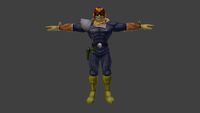| Display title | T-pose |
| Default sort key | T-pose |
| Page length (in bytes) | 6,091 |
| Page ID | 31635 |
| Page content language | en - English |
| Page content model | wikitext |
| Indexing by robots | Allowed |
| Number of redirects to this page | 5 |
| Counted as a content page | Yes |
| Number of subpages of this page | 0 (0 redirects; 0 non-redirects) |
| Page image |  |
| Edit | No extra protection (infinite) |
| Move | No extra protection (infinite) |
| Page creator | NESNess (talk | contribs) |
| Date of page creation | 18:42, September 4, 2012 |
| Latest editor | Plague von Karma (talk | contribs) |
| Date of latest edit | 08:07, August 12, 2024 |
| Total number of edits | 165 |
| Recent number of edits (within past 90 days) | 0 |
| Recent number of distinct authors | 0 |
| Meta category (1) | This page is a member of 1 meta category:
|
| Transcluded templates (8) | Templates used on this page:
|
Description | Content |
Article description: (description)
This attribute controls the content of the description and og:description elements. | A T-pose, sometimes known as a bind pose or reference pose, is the default, unanimated state of a 3D model. The model's moving parts are all straightened out or flattened for ease of animation; in most cases, this results in a pose where the... |
